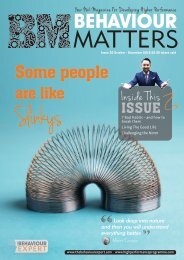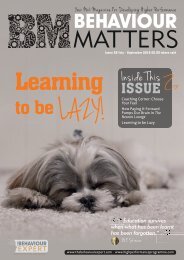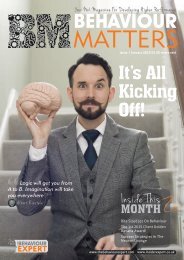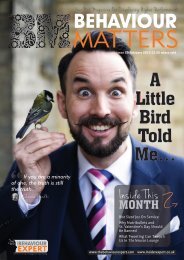Behaviour Matters June 2015
You also want an ePaper? Increase the reach of your titles
YUMPU automatically turns print PDFs into web optimized ePapers that Google loves.
Inside Jez’s<br />
Brain<br />
Liar, Liar, Pants On Fire<br />
Just last week I was sat in a meeting watching<br />
someone lie through their teeth about how<br />
they had not only completed a project but also<br />
done a significant amount of research for it, too.<br />
Only the completed project wasn’t with them because – and here<br />
comes the emotional tug on the heart strings – there was a computer<br />
problem and then an incident with a cat and some coffee and a baby<br />
crying and a family breakdown and then an argument and then<br />
something else about the baby and then a problem with the fish. It<br />
was heartbreaking. It was Oscar-winning. It was all lies.<br />
The others around the table bought into the story and extended the<br />
deadlines, made a lot of calls to rearrange the workload and enable<br />
things to continue without the required details and content from the<br />
project. I was put in a compromising position because I knew that<br />
the individual had made all but one of the things in her story up (the<br />
cat really did knock over the coffee cup). How did I know? Because<br />
truth detection and the science of uncovering untruths is a personal<br />
interest of mine and over the past ten years or so I’ve read a lot of<br />
literature, attended quite a few lectures and befriended quite a few<br />
specialists in the field of lying – years ago I used to give a lecture<br />
about how to spot a liar – and how to flush one out!<br />
Contrary to popular belief, liars tend to give themselves away more<br />
through what they say rather than their body language. Their normal<br />
speaking pattern will be different, so look out for changes to the way<br />
in which they speak; either sped up or cautiously forming sentences,<br />
for example. Most liars will commit less, say less and speed up<br />
There are subtle tell-tale signs that our<br />
bodies do, which give us away, too.<br />
when lying, so as to incriminate themselves as little as possible and<br />
to get the lie over with as quickly as possible. Listen to elements of<br />
discomfort, too: regular breaks in the voice, a less uniform tone and<br />
changes to the words that they use. For example, in the famous lying<br />
studies, most subjects spoke about other people or things more than<br />
themselves, when they were lying.<br />
There are subtle tell-tale signs that our bodies do, which give us<br />
away, too. Our feet often subconsciously point towards the exit in the<br />
room, our fingers fiddle and there is an increase in facial touching.<br />
When we smile naturally, responsively, as a result of feeling happiness<br />
or sensing something amusing, our smiles appear quickly and<br />
symmetrically. The muscles instinctively and automatically create<br />
that visual response – take a look for yourself the next time you make<br />
someone laugh: their smile appears without reservation. However, a<br />
false smile is slower and lopsided or crooked; it’s not natural.<br />
Where you can consciously control your heart rate, your bladder and<br />
indeed your brain, the movement of your eyes (pupil dilation and<br />
rapid eye movement, for example) is one of the few reactions in your<br />
body over which you have absolutely no control. Our eyes give us away<br />
more than you could ever possibly imagine. When we are nervous<br />
our eyes often move rapidly and as we grow more uncomfortable<br />
with the lie we are telling, our heart rate increases and as a natural<br />
response, our pupils dilate. It has also been observed that people’s<br />
eyes will often dart towards the exit of a room as subconsciously they<br />
want to remove themselves from the lie and thus the environment<br />
they’ve found themselves in.<br />
Despite a lot of pop psychology information written on lying to<br />
the contrary, and despite the fact that most of our registered<br />
communication is actually non verbal (a whopping 55% of the way<br />
that we relate to each other is via body language: facial expressions,<br />
posture and gestures and 38% is attributed to how what we hear<br />
sounds; the volume, intonation etc) the very best way to catch out<br />
a liar is to listen to what they say. The math whizz readers will have<br />
calculated that just 7% of how we relate to each other and effectively<br />
communicate is down to the words that we use.<br />
The important point, before you start brandishing people a liar for<br />
simply scratching their nose, is that all of these points need to be<br />
taken in context. It’s unlikely that you’ll see any one of these signs in<br />
isolation (which does help with our itchy nosed colleagues).<br />
Don’t Forget...<br />
Join me on twitter @JezRose<br />
for succinct advice, fun and<br />
SPECIAL OFFERS!<br />
3












